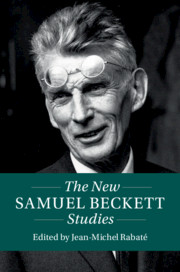Book contents
- The New Samuel Beckett Studies
- Twenty-First-Century Critical Revisions
- The New Samuel Beckett Studies
- Copyright page
- Contents
- Figures
- Contributors
- Editor’s Introduction
- I The Expanded Canon
- II New Contexts and Intertexts
- III New Hermeneutic Codes
- Chapter 9 Beckett’s Queer Art of Failure
- Chapter 10 “Que voulez-vous?”
- Chapter 11 Beckett’s Disabled Language
- Chapter 12 Beckett and Mathematics
- Chapter 13 Beckett’s Bilingual Explorations
- Chapter 14 Waiting for Godot among the Prisoners
- Index
Chapter 14 - Waiting for Godot among the Prisoners
from III - New Hermeneutic Codes
Published online by Cambridge University Press: 17 June 2019
- The New Samuel Beckett Studies
- Twenty-First-Century Critical Revisions
- The New Samuel Beckett Studies
- Copyright page
- Contents
- Figures
- Contributors
- Editor’s Introduction
- I The Expanded Canon
- II New Contexts and Intertexts
- III New Hermeneutic Codes
- Chapter 9 Beckett’s Queer Art of Failure
- Chapter 10 “Que voulez-vous?”
- Chapter 11 Beckett’s Disabled Language
- Chapter 12 Beckett and Mathematics
- Chapter 13 Beckett’s Bilingual Explorations
- Chapter 14 Waiting for Godot among the Prisoners
- Index
Summary
Eight months after its 1953 premiere at the Babylon Theater in Paris, inmates translated, staged, and performed Man wartet auf Godot (Waiting for Godot) inside Lüttringhausen Prison. A chasm separated these performances. At its world premiere, Godot received a dismal response. An editorial at Le Monde reported that director Roger Blin had to drop the curtain before the end of Act I because of “sifflets, insultes, rien n’y manqué” [“whistles, insults, the works”] and that many in attendance departed vociferously at the start of Act II upon realizing that nothing had changed during the intermission. At its nether-world premiere, Godot was a transfigurative experience for the prisoners. After the first night, inmate K. F. Lembke wrote to Beckett, inviting him to the production and raving, “Votre Godot ce fut un triomphe, le délire – votre Godot ce fut ‘notre’ Godot, à nous! bien à nous!” [Your Godot was a triumph, a delirium – Your Godot was ‘Our’ Godot, ours! ours!].
- Type
- Chapter
- Information
- The New Samuel Beckett Studies , pp. 248 - 260Publisher: Cambridge University PressPrint publication year: 2019

